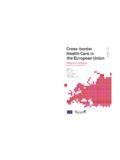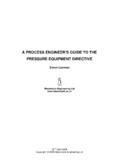Transcription of The Security Dimension - Charles Tannock
1 BREXIT: The Security DimensionDr Charles Tannock MEPA cknowledgmentsFirstly I would like to thank the Director of British Influence PeterWilding and in particular his Deputy Director Jonathan Lis andResearcher Tyler Hanley for carrying out the lengthy research forthis paper. It included extensive interviews of EU officials andMember State diplomats both in London and Brussels in theinitial preparation of the paper and assistance in writing the firstdraft. I would also like to thank my peer reviewers: ProfessorKenneth Murphy, Professor Nicholas Whyte and Dr GerrardQuille. Dr Garvan Walshe of Brexit Analytics was invaluable as itwas he who advised on the final structure and content. Lastly Iwant to thank my Parliamentary Assistants William Lavenderand James Warwick for additional research and for proof readingthe final the Author Dr Charles Tannock MEPA former medical doctor and NHS Consultant Psychiatrist andHon Senior Lecturer at UCL Medical School, London.
2 He was firstelected to the european Parliament in 1999 representingLondon for the Conservative Party and re-elected for the fourthtime in 2014. Former Vice-President of the EP Delegation to theNATO Parliamentary Assembly 2009-14. Currently UKConservative Foreign Affairs Spokesman and ECR Coordinator(Spokesman) on the Foreign Affairs Committee. He is aCommissioner for Human Rights of the Conservative at Balliol College, Oxford, and Middlesex HospitalMedical School, London University. He is married with threechildren. He has been decorated by several foreign governmentsfor services to international Charles Tannock MEPP reface by the AuthorEight months after the UK electorate decided on June 23rd byreferendum to leave the european union we are now, following theFebruary 2nd Government White Paper and the Vote in the UKParliament to authorise triggering Article 50, somewhat wiser tothe shape the two year Brexit negotiations will take as far as theUK s main objectives are for future UK relations with the EU27.
3 I have been a long-time proponent of the underlying purpose ofthe european union and campaigned strongly for a Remain is by no means perfect but it has brought peace and prosperityto Europe for the last half century and is a force for good in amodern world in which globalisation makes cross-bordercooperation ever more necessary. Its reversal or disintegrationdoes not augur well for good global governance or long termstability. The referendum, whilst not legally binding, was clearlyconducted on an understanding that its result would berespected. There was, however, no accepted view of whatleaving the EU would look like and the terms for leaving werepoorly outlined and no single message has since emerged fromthe fractious Leave campaigners. In particular, little debate wasseen on the issues of Security and foreign or defence concernsbeyond the exaggerated threat of a standing EU army which ismost unlikely to see the light of day any time soon as my papermakes very have represented London as a Conservative Member of theEuropean Parliament for almost eighteen years and I hope tocontinue to do so for as long as the UK remains an EU there was a clear majority in London for the UK to remain amember of the european union emboldens me to oppose thehard-line Brexiteers that are seeking to interpret the referendum asa means to completely detach Britain from Europe and all vestigesof political cooperation with the EU, and thus reject continuedcoordination on the Common Foreign and Security Policy (CFSP)and the Common Security and Defence Policy (CSDP).
4 Very shortly, probably in March 2017, the Government will triggerArticle 50 and the starting gun to the complex and potentiallyadversarial negotiations with the EU 27 will , this paper is aimed at better informing the widerpublic, media and opinion formers about the key issues, oftenlittle understood surrounding Brexit and Security . This is an areaI can meaningfully contribute to after sixteen years asConservative Spokesman on the subject and I hope this paperhelps make the case to the British the future relationship between Britain and the EU, theGovernment has some very tough choices to make that willaffect Britain for future generations. 4 IndexRecommendations6 Introduction9 Chapter One11 Brexit and internal securityIntroduction EU Level AgreementsEuropolEurojustEuropean Arrest WarrantPassenger Name RecordSchengen Information System II & european Criminal Records Information SystemPr m ConventionFRONTEXB ilateral/non-EU AgreementsLe TouquetIntelligence Services CooperationUK-Irish BorderConclusionChapter Two17 CFSP/CSDP: the impact of Brexit on UK and european foreign and Security policyIntroductionWhat is and isn t the CSDP?
5 Britain and CSDP who gains?CSDP vs NATO?A model along the lines of Finland and Sweden in NATO, or Norway in CSDP?How far can Britain stay linked to the CSDP and what does it lose from withdrawing?The Political and Security Committee how close can the UK s links be?EURATOMThe future of the CSDP, and implication of a full British withdrawalThe election of Donald Trump: weakened NATO and strengthened CSDP?Annex27 Britain s Security in Europe: A history of engagement post WWII5 RecommendationsDespite the Prime Minister s public pronouncement thatBritain is to leave the EU and will not retain bits ofmembership 1, very few people and certainly not Mrs May publicly state that it is in Britain s interests to abandon theEuropean internal and external Security structures in order toact entirely independently in an ever more dangerous Ministers and officials both in Britain and the EU makeclear, the principal Security threats facing the UK are trans-national and cross-border in nature, whether it beinternational terrorism or the action of hostile states fromNorth Korea to Russia.
6 From Europol to the CSDP, Security has been interwoven intothe european machinery and that means that it will indeedhave to be one of the bits of membership or as close tomembership as possible that the UK should seek to it may be seen as throwing the baby out with thebathwater to abandon the Single Market, making Britainexplicitly less safe in the service of Brexit would be consideredan act of gross negligence by any responsible governmentcommitted to defence of the realm as its top Government White Paper2published on February 2nd The UK s exit and new partnership with the EU makesreassuring statements about staying engaged on securitymatters both in the fight against international crime andterrorism and supporting the CFSP and CSDP but doesn tspecify a detailed course of action or negotiation objectivesin this respect. It merely states it wishes to get the best report therefore tries to highlight the priorities and thevarious options that the UK can consider to mitigate thepotential damage to foreign and Security policy from a consequence, it offers the following recommendations:1.
7 Keep internal Security , as far as possible, separatefrom the most contentious items on the Brexit agenda. Particularly on such issues as Europol, Schengen InformationSystem etc., it will be in nobody s interest to risk an abrupt( cliff-edge ) British withdrawal. Working negotiation groupscan establish the main frameworks for continuedassociation, which may then be agreed early on. Internalsecurity should not be seen as either a bargaining chip ornegotiating tool by either side. There is a risk that the EU willtake the attitude that nothing is agreed until everything isagreed : this could prove disastrous to UK Security if the talksbreak down in acrimony during the two year Article 50period. The UK must consequently seek to build goodwill atevery stage of the process and settle this priority policy areaas early as Theresa May: UK cannot keep bits of EU membership , BBC News, 8 January 2017: author with Prime Minister Theresa May in July 2016 at No 10 where the author first raised the issue of staying engaged with the EU on Security policy after Brexit72.
8 Given that so far the UK shoulders proportionallyless of the CSDP burden than other Member States,it should counter-intuitively offer to go further afterBrexit, and actually increase its funding and supplyof personnel. This may help to earn it some of the decision-shaping andmaking capacity that would otherwise be lost; and also, earnit goodwill in the negotiations and after Brexit even if itcannot yield quid-pro-quos in other areas. It could evenencourage new developments such as the deployment ofthe EU rapid-reaction forces (under the control of individualMember States). Certainly, it should offer to assist andparticipate in CSDP missions whenever NATO chooses not tobecome involved, or when NATO (as is often the case inAfrica or Non Aligned Movement countries) is not greater involvement is in the British national interestand it would be counter-productive to put it in question aspart of the Article 50 negotiations.
9 Our Security surplus onlyexists insofar as British commitment is thought to bereliable. The UK should routinely attend the six monthlyinformal Gymnich meetings of EU Foreign Ministers and theinformal meetings of DefenceMinisters, in order to stay closelyinvolved with the decision makingprocess. 3. Seek to remain as apermanent observer in thePolitical and Security Committee. As the key decision-shaping andmaking body of the CFSP/CSDP, theUK should attempt to remain as closeto it as possible. If this status is notpossible, the UK should attempt bothformal and informal approaches, suchas associate membership, or toarrange weekly meetings with seniorEEAS staff. Certainly, the UK shouldretain a permanent PSC diplomat ofambassadorial rank and consider posting high rankingmilitary liaison officers stationed permanently in Brussels atthe EU Military Staff and attached to the post-Brexit UKmission to the EU. The NATO Partnership for Peace modelis a good one in that it provides for senior diplomats fromnon-NATO countries like Russia and Ukraine to be stationedin the NATO HQ for ready consultation and access.
10 The offerof a continued Operation Headquarter (OHQ) in Northwoodfor EUNAVFOR ATALANTA post Brexit and other future CSDP missions should be actively considered. The UK shouldmaintain seconded liaison staff at the EU Intelligence andSituation Centre (INTCEN) and negotiate a deal similar tothat enjoyed by the US with the EU for the sharing ofconfidential intelligence and planning Seek the closest cooperation in the defenceindustries which, like the car industry, ideallymeans membership of both the EU Single Market andCustoms UK Government has regrettably indicated it will take theposition in its White Paper of 2nd February that it isnecessary to leave the Single Market, and, most probably,the EU Customs union in order for the UK to regain control ofimmigration from the EU and be outside the jurisdiction ofthe ECJ. This, in the author s view, would have majoreconomic costs for the UK and threaten both its prosperityand thus ability to continue to easily fund its commitment tospend 2% of GDP on defence and potentially its unity, givenScotland s strong preference for remaining in the EU.






